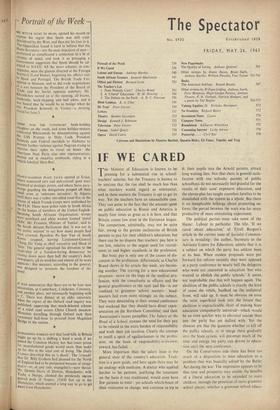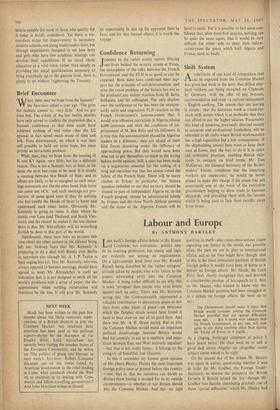IF WE CARED
But basic pay is only one of the causes of dis- content in the profession; differentials, as Charles Brand shows in his article this week, are becom- ing another. The craving for a new educational structure—more on the lines of the medical pro- fession, with the consultants as officers and the general practitioners as the rank and file—is not confined to grammar school masters: head- masters feel even more strongly on the subject. They were demanding at their annual conference last weekend that they should have direct repre- sentation on the Burnham Committee; and their Association's recent paniphlet, The Salary of the Head of a School, stresses the need for their pay to be related to the extra burden of responsibility and work their job involves. Clearly the attempt to instill a spirit of egalitarianism in the profes- sion, on the basis of responsibility-is-its-own- reward, has failed.
More important than the salary issue is the general state of the country's education. Tradi- tion is a poor guide, and here again there may be an analogy with medicine. A doctor who applied leeches to his patients, justifying the treatment on the basis it was traditional, would soon have few patients to treat : yet schools which•boast of their resistance to change, and continue to try to fit their pupils into the Arnold pattern, attract long waiting lists. Not that there is general satis- faction with our schools; parents of public schoolboys do not necessarily feel grateful for the results of their sons' expensive education, and the 'eleven-plus has taught countless families to be dissatisfied with the system as a whole. But there is an inexplicable lethargy about promoting re- form; the period between the wars was far more productive of more stimulating experiment.
The political parties must take some of the blame: Labour in particular. The title, 'If we cared about education,' of Tyrell Burgess's article in the ,current issue of Socialist Commen- tary is revealing: the author, Secretary to the Advisory Centre for Education, admits that it is a subject on which the party has seldom been at its best. When modest proposals were put forward for reform recently they were opposed at a party conference by nearly half the delegates who were not interested in education 'but who wanted to abolish the public schools.' It seems not improbable that this will happen again. The abolition of the public schools is exactly the kind of cause the rebels, baulked on the unilateral front, will take up. It must be obvious on even the most superficial look into the future that abolition is impracticable, short of making State education compulsorily universal—which would be an even quicker way to electoral suicide than any the party has yet dallied with. Yet the chances are that the question whether to kill of the public schools, or to merge them gradually into the State system. will pre-empt much of the time and energy the party can devote to educa- tion until the next conference.
On the Conservative side there has been too much of a disposition to treat education as a problem that was basically solved' by the Butler Act during the war. The impression appears to be that time and prosperity may enable the benefits of a liberal education to be extended to more children, through the provision of more grammar school places; whether a grammar school educa-
tion is suitable for most of those who qualify for it today is hardly considered. Yet there is tre- mendous scope for improvement in secondary modern schools, not along traditionalist lines, but through experiments designed to see how boys and girls who have few academic leanings can develop their capabilities. If we cared about education as a vital force, rather than simply as providing the social qualifications necessary to bring everybody up to the gamma level, there is plenty to do without frightening the Treasury.















































 Previous page
Previous page